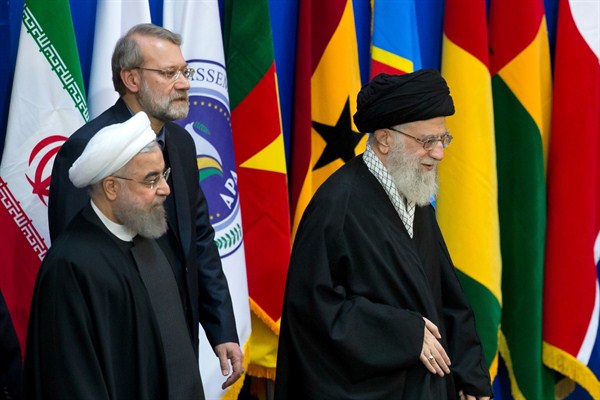Only a few months ago it was the conventional view that regional dynamics in the Middle East were working in Iran’s favor. By this account, Tehran was accumulating growing influence through its direct or indirect involvement in the region’s crises and conflicts, buoyed by the confidence born of sanctions relief after the nuclear agreement with the international community. But the picture is not so clear today. In fact, other regional trends involving Russia, the new administration in Washington, and Israel might be converging to put Iran on its back foot.
The geopolitics of the Middle East are moving too fast for any measured assessment of durable trends. Strange bedfellows and spurned alliances are commonplace. Just recall the awkward and so far unproductive cooperation between Turkey and Russia over Syria, or the tripartite meeting in southern Turkey of American, Russian and Turkish generals to deconflict operations targeting the so-called Islamic State in Syria. Another case in point is how the major Arab states maintain an old discourse about Israel at the United Nations, while quietly expanding security cooperation with Israel. Yet in each of these examples, Iran can be seen as losing ground, unable to either set or block the agenda as its regional peers and rivals work to protect their core interests and manage relations with the U.S. and Russia.
Starting with Russia, Iran is right to be worried that its partnership with Moscow has moved from an alliance of convenience to an even less steady state. When it intervened militarily in the Syria crisis in 2015, Moscow had clearly determined that Iran’s support for the regime of President Bashar al-Assad was not achieving its goals. Now Moscow has taken the lead in international efforts to stabilize if not solve the crisis, and has turned to Turkey as the more useful partner, with Ankara’s presumed access to the Syrian opposition forces. So far, that hasn’t worked out so well; several rounds of the Russian-led diplomatic initiative have failed to make progress, and there’s ample evidence that the Turks do not have sufficient leverage over the Syrian anti-Assad forces to sustain diplomatic efforts. But notwithstanding the poor results, Tehran surely sees these recent developments as diminishing its special cooperation with Russia and as an implicit reproach of its own Syria strategy.

